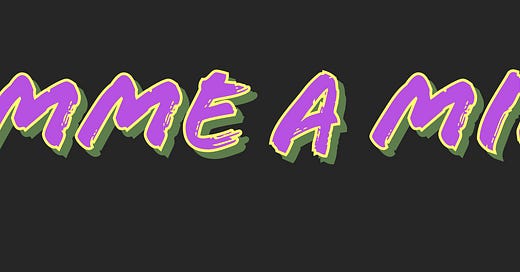Do you have regular interactions with middle schoolers? Do those interactions often leave you confused? Do you lack the necessary terminology and reference points to make sense of the middle schoolers’ language and behaviors? If the answer to any of those questions is “Yes,” have no fear. Through painstaking research, I have identified three terms currently being used by middle schoolers. Understanding these terms will give you a little more ability to communicate with the middle schoolers in your life (if you choose to attempt to do so).
Editor’s Note: These are terms currently being used by middle school boys. I cannot vouch if they are in active use (or in the same manner) by middle school girls.
The Griddy (aka Griddying)
In the most basic terms, the Griddy is a dance (click here for a tutorial). The origins of the Griddy are said to be Allen “Griddy” Davis. Davis is said to have invented the dance in high school while playing football and uploaded videos to Youtube. A high school teammate of Davis brought the dance to the collegiate level, and from there it spread to the NFL. Its cultural significance was solidified when it became a feature in the popular video game “Fortnite.”
While knowing the history of the Griddy helps to explain the near universal middle school knowledge of the Griddy, it does not fully explain its current usage among middle schoolers. At this point, it seems the Griddy is being used ironically by middle schoolers. A middle schooler (who wished to remain anonymous) told me, “people don’t griddy seriously…it’s not suppose to look good.”
At this point, it appears middle schoolers are performing the griddy as a joke. Moreover, it seems very likely that the griddy will disappear from regular usage in the not too distant future, at least by middle schoolers. This is supported by two other phenomena. First, there have been reports of parents, teachers, and even school administrators who have become proficient griddyiers. This is a sure sign that a middle school phenomena has begun to decline, as these adults are scientifically proven to be “cringe.” Second, there has been a reported rise in the use of the griddy by elementary students. Known as “the dab effect,” when the elementary age students begin mimicking their middle school counterparts (generally without the inherent sarcasm of middle school), a trend is officially over. This trend is still worth noting as you will be periodically subjected to it again over the coming decades: proms, graduations, weddings, etc… Whenever their is a gathering of contemporaries, this will make a brief, nostalgic reappearance.
Grind (aka To Grind)
Grind is obviously a word that has been around forever, and has different meanings depending on the context. If you are a coffee aficionado, the word “grind” brings to mind the pulverizing of beans. If you are a skateboarder, you think of riding the board across the curb. If you are talking modern middle schoolers, the term “grind” refers to working hard and devoting yourself full to a task.
In many ways, this use of the word is actually very traditional. It hearkens back to the Dickensian usage of “nose to the grindstone.” While the basic meaning itself is familiar to us, it is used only in very specific context for the middle schooler. When one grinds, one is engaged in a favored activity. For example, grind is often used when describing video game play. A middle schooler may grind “Call of Duty.” This means they engage in extended, intense play at the video game. Often, this play is focused on accomplishing a specific goal or earning in-game rewards.
Use your knowledge of this word with caution. There are few things worse in the eyes of a middle schooler than a parent or other adult awkwardly engaging in their popular culture. The adult may think they look “hip” because they understand the middle schoolers cultural reference points, but in reality you look like Elaine dancing at the office party. (If you understand this reference, then you are in the awkward adult zone.) If you attempt to tell your middle schooler “to grind some homework,” at best you will be met with eye rolls. I would encourage adults not to use this term. Doing so will expedite the dropping of the terms from the middle school lexicon. Then, we will be back to square one trying to figure out what the hell these kids are saying.
Bro
From Frat boys to surfers, the word bro has been in common usage for decades now. Depending on the speaker and the context, the use and pronunciation of the word is different. Obviously, “bro” is an abbreviation of the word “brother.” However, the connection between the middle school usage of “bro” and its word of origin seems tenuous at best. The same anonymous middle school source explained, “(bro) refers not to the person I am referring to.” If this explanation does not make sense to you, do not worry. It simply means you are not a middle schooner.
The source went on to state that the word is sometimes used as a “preposition.” Although the sources did not seem to understand what a “preposition” really is. What is clear from the research, is that “bro” is being used in an incredibly flexible manner. “Bro!,” pronounced quickly and with some volume is an exclamatory statement used to express surprise. “Broooooo,” where the word is dragged out and the volume drops off at the end, is used to express concern, worry, or disappointment. I have personally witnessed the term being used to replace the word “mom.” The versatility of the word is fascinating.
Like grind, adults are faced with a dilemma when it comes to the use of the word “bro.” While it has been in use for decades, the younger generation has claimed it as their own. While there is no firm answer as to who “owns” the word. There is a rule of thumb we should all follow. No man over thirty (late twenties is questionable) should use the term “bros” when referring to their friends. The only exception is if you are an honest to god surfer who is either a paid professional or who lives in a van on Malibu Beach. (To be honest, I am not sure that both can’t be true.) Otherwise, the term “bro” will belong to the younger generation in perpetuity to use as they see fit. Take comfort in the fact that today’s middle schoolers while be tomorrow’s middle aged adults who are frustrated by the younger generation’s use of “bro.”

It is impossible to fully understand the terminology and reference points of today’s middle schoolers. As was noted in this article, once the adults understand and can use the middle school terminology correctly, the term is on its way out. As adults we will constantly strive o understand as much of their vocabulary and behavior as possible. But, I caution you to use this knowledge thoughtfully. Do not try to be a cool parent or adult. Being cool and being an adult are incompatible to middle schoolers. This is not to say that you cannot griddy. But, do so only with the intent to drive the dance into obscurity.







